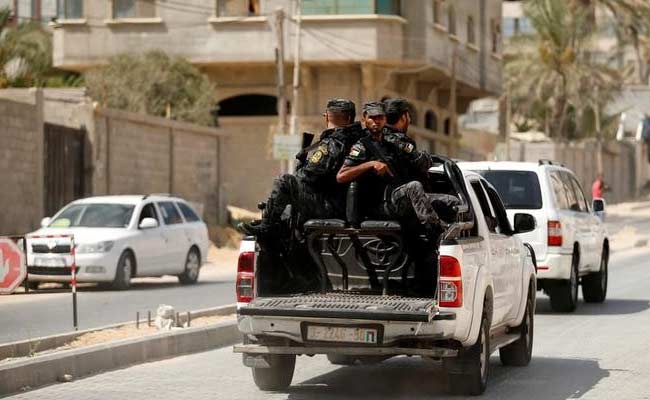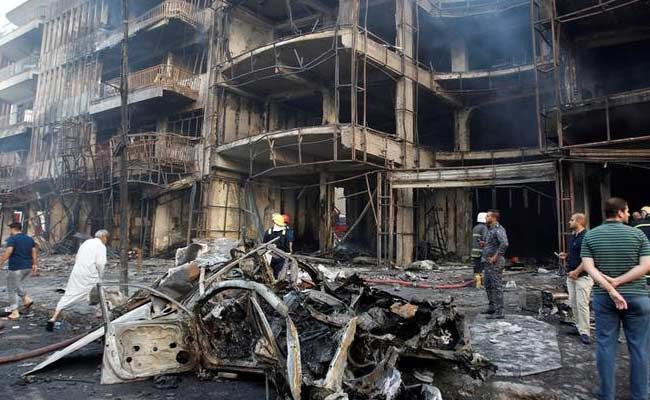Khaled Mashal heads Hamas which controls the Gaza Strip and is labelled a terrorist by Israel.
Doha, Qatar:
In a safe house on a quiet street in Doha lives one of the most wanted men in the world.
Khaled Mashal is the head of Hamas, the Palestinian faction that controls the Gaza Strip, but is labelled a terrorist outfit by the United States, the EU and Israel.
Meeting Mashal is not easy - he lives in exile in Qatar because of that terrorist tag and a very specific threat to his life from Israeli intelligence (Israel made an attempt to assassinate him in 1997). But hearing from Mashal is essential: the atrocities of the Islamic State or ISIS and the Syrian war may have eclipsed the Israel-Palestinian conflict, but that conflict remains key to the unrest and evasive peace in the Middle East.
Frictions have worsened in recent months because of the growing influence of hardliners on both sides, Israeli and Palestinian.
A major stumbling block to peace from the Palestinian side is seen as Hamas, which controls the Gaza Strip, and whose violent methods invite comparisons with ISIS.
Long before ISIS came into being, Hamas' charter, framed in 1988, suggests a violent Islamic takeover of Israel ("Israel will exist and will continue to exist until Islam will obliterate it.")
It says "jihad is the path (to that goal) and death for the sake of Allah is the loftiest of its wishes."
 Mashal, however, told NDTV in an exclusive interview that "(Israel's Prime Minister) Netanyahu and the Israelis have always thrown those allegations against our people since they are the real terrorists. There is a vast difference between us as a national liberation movement, a legitimate resistance against (Israeli) occupation, which is a right reserved for all people under occupation in international law, in the divine faiths, in all human experience. We are against those random killing extremist movements who are killing on basis of religion or faith or sect."
Mashal, however, told NDTV in an exclusive interview that "(Israel's Prime Minister) Netanyahu and the Israelis have always thrown those allegations against our people since they are the real terrorists. There is a vast difference between us as a national liberation movement, a legitimate resistance against (Israeli) occupation, which is a right reserved for all people under occupation in international law, in the divine faiths, in all human experience. We are against those random killing extremist movements who are killing on basis of religion or faith or sect."
But Hamas's fighters continue to use what some say are terrorist-like methods, exploding suicide bombs, or firing rockets at Israeli civilian targets from civilian locations in the densely-populated coastal area of Gaza.
During 2014, at the height of the most recent Gaza conflict, NDTV filmed a Hamas team assembling and firing a rocket from a residential area, a report that made international headlines.
Mashal didn't deny the controversial practise, but claimed no choice. "Gaza is a very small area. It is a very limited area condensed with its occupants," he said. "The resistance has the right to choose the places where they can cover up their defensive weaponry to react to the aggression of the enemy in their best interest."
 A bigger impediment to progress, however, remains Hamas' rejection of negotiations. Reports suggest that Egypt is trying to break the current impasse between Israel and Palestine by hosting a peace summit in Cairo. Netanyahu is said to have given his consent; so has Mahmoud Abbas, head of the moderate Palestinian Authority.
A bigger impediment to progress, however, remains Hamas' rejection of negotiations. Reports suggest that Egypt is trying to break the current impasse between Israel and Palestine by hosting a peace summit in Cairo. Netanyahu is said to have given his consent; so has Mahmoud Abbas, head of the moderate Palestinian Authority.
If the meeting does take place, Hamas will be absent. Mashal blames that on Israeli hardliners. He says in the interests of Palestinian unity, Hamas is willing to accept a solution that will establish a Palestinian state on the basis of the borders before the 1967 war, during which Israel entered significant areas of Gaza and the West Bank.
"We are keen to unify the Palestinian front, the Arabic Front and attract the support of the world for our rights. And that's why we have agreed in consensus among us Palestinians on a national programme that is supported by the Arabs on establishing a sovereign independent Palestinian state along the lines of 1967 borders, with Jerusalem as the capital, with right of return for the Palestinians in exile", he said.
But Israel, which over the years has constructed massive settlements inside Palestinian territories, is said to be unwilling to make the 1967 borders a basis for talks.
That, Mashal claims, is the reason why Hamas believes talks are useless. "The Palestinian Authority is negotiating. It's engaging in this process for long time and they demanded the Israeli side to the basis for such a negotiation process. But the Israelis are denying them that basis. That's why the negotiation process has been useless. It's just been a mirage for repression," he said.
Khaled Mashal is the head of Hamas, the Palestinian faction that controls the Gaza Strip, but is labelled a terrorist outfit by the United States, the EU and Israel.
Meeting Mashal is not easy - he lives in exile in Qatar because of that terrorist tag and a very specific threat to his life from Israeli intelligence (Israel made an attempt to assassinate him in 1997). But hearing from Mashal is essential: the atrocities of the Islamic State or ISIS and the Syrian war may have eclipsed the Israel-Palestinian conflict, but that conflict remains key to the unrest and evasive peace in the Middle East.
Frictions have worsened in recent months because of the growing influence of hardliners on both sides, Israeli and Palestinian.
A major stumbling block to peace from the Palestinian side is seen as Hamas, which controls the Gaza Strip, and whose violent methods invite comparisons with ISIS.
Long before ISIS came into being, Hamas' charter, framed in 1988, suggests a violent Islamic takeover of Israel ("Israel will exist and will continue to exist until Islam will obliterate it.")
It says "jihad is the path (to that goal) and death for the sake of Allah is the loftiest of its wishes."

Palestinian security forces loyal to Hamas guard the northern Gaza Strip. (Reuters photo)
But Hamas's fighters continue to use what some say are terrorist-like methods, exploding suicide bombs, or firing rockets at Israeli civilian targets from civilian locations in the densely-populated coastal area of Gaza.
During 2014, at the height of the most recent Gaza conflict, NDTV filmed a Hamas team assembling and firing a rocket from a residential area, a report that made international headlines.
Mashal didn't deny the controversial practise, but claimed no choice. "Gaza is a very small area. It is a very limited area condensed with its occupants," he said. "The resistance has the right to choose the places where they can cover up their defensive weaponry to react to the aggression of the enemy in their best interest."

Around 300 people were killed in bombing claimed by ISIS in Baghdad this month.
If the meeting does take place, Hamas will be absent. Mashal blames that on Israeli hardliners. He says in the interests of Palestinian unity, Hamas is willing to accept a solution that will establish a Palestinian state on the basis of the borders before the 1967 war, during which Israel entered significant areas of Gaza and the West Bank.
"We are keen to unify the Palestinian front, the Arabic Front and attract the support of the world for our rights. And that's why we have agreed in consensus among us Palestinians on a national programme that is supported by the Arabs on establishing a sovereign independent Palestinian state along the lines of 1967 borders, with Jerusalem as the capital, with right of return for the Palestinians in exile", he said.
But Israel, which over the years has constructed massive settlements inside Palestinian territories, is said to be unwilling to make the 1967 borders a basis for talks.
That, Mashal claims, is the reason why Hamas believes talks are useless. "The Palestinian Authority is negotiating. It's engaging in this process for long time and they demanded the Israeli side to the basis for such a negotiation process. But the Israelis are denying them that basis. That's why the negotiation process has been useless. It's just been a mirage for repression," he said.

